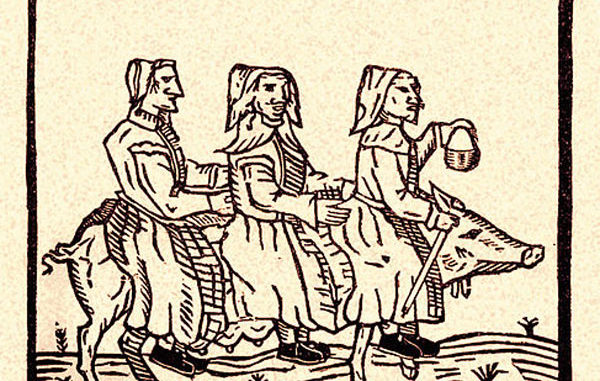Anyone who has spoken to me over the last few years will know I have somewhat become a bit obsessed with witches. I don’t, of course, mean the pointy hats and stripey tights of Hallowe’en, but historical witches. Witch trials. Accusations of harmful magic. The poor women (and men) who were accused of convening with the Devil and hanged for it.
But there’s also a degree of fascination with the pointy hats and stripey tights. And the WitchTok phenomena. And the aesthetic… I do happen to own a small cauldron, oddly coloured candles, tarot cards and a crystal ball…
I loved the idea of magic as a teenager – I remember getting a pendulum on the front of one of those now (presumably defunct) teen girl magazine like Just 17, and being, on the one hand, entirely obsessed with the idea of fortune telling and the universe guiding me through magical spiritual forces, but on the other hand, 100% sceptical that this could be remotely real. I devoured books on astology, but couldn’t quite make myself fall in line with the belief system around it.
And so this back and forward internal struggle with the concepts of magic, of contemporary witchcraft, went on. I’d dip my toe in, realise that lovely as the idea seemed, I couldn’t get on board with it enough to take it seriously.
In 2017 we moved to Northampton. I grew up in Birmingham, which at the height of the witch craze in England was a nothing-y little town, and as far as I’m aware, nothing nearly as exciting as a witch trial took place (or at least, a quick Google search brings up nothing of the sort). Northampton, however, has a rich and important history of being a town of rebels and misfits, of going against the grain, and of a witch hunt and trial that took place in 1612.
Elizabeth Belcher, who’s husband had run off to the Netherlands, became ill around a year after striking one Joane Vaughan (or Varnam) in the street. Belcher’s brother, Master Avery, comes along, declares it witchcraft, and begins to make up stories about not being able to approach the house of Joane and her mother, Agnes Browne, because of harmful magic, and of a group of women riding on the back of a pig. He mainly accuses Joane and her mother, but also a number of other women (their names depend on which of the two remaining source materials you’re reading). Only Agnes and Joane’s outcomes are known – they were found guilty, and hanged alongside two other women and one man on 21 July 1612 at Abington Gallows.

This trial happened not long before the infamous Pendle Witch Trial – so why is it not so well known? Sadly, thanks to the Great Fire of Northampton burning down All Hallows Church in 1675, the only remaining sources we have are a tabloid-esque propaganda pamplet and the manuscript of notes made by someone who attended perhaps one day of the trial at Northampton Castle. No court records survived.
But to what does all this lead? I’ve been deep in research mode (aka buying books) on the subject, attending seminars, watching documentaries, and I have learned SO MUCH that I didn’t know, and realised that a lot of what we all think we know about the witchtrials is utterly made up.
It wasn’t just women (although, in England at least, it was primarily women. In Iceland for example, it was predominantly men)
Witches were not burned at the stake in England – they were hanged. Witchcraft was heresey, and you were only burned for treason.
Midwives were more likely to be involved on the prosecutors side than to be the defendant in a witch trail – their services were used to discover witches marks on the suspects.
Henreich Krammer and his twisted toxic masculinity and bruised pride has a lot to answer for. (Google Malleus Maleficarum… *shudders* )
I’m hoping to distill all this newfound knowledge into a retelling of the Northampton Witch Trial as an audio trail around Abington Park where the gallows may have been. Next on my list is an online seminar through Theatre 503 with one of my favourite playwrights – Morgan Lloyd Malcom – about writing about historical figures, which should come in handy…
But for now, I shall revel in following my favourite witchcraft Professors on Threads and learning even more about witches. And failing to memorise any of the tarot card meanings…